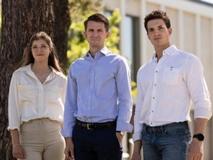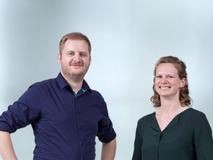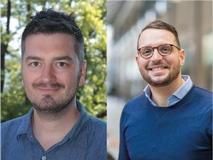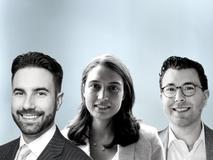CHF 40,000 for startups developing a digital therapy service, a novel neurofeedback approach, a non-invasive sensory wearable for amputees, and a visual field testing software
27.12.2021
Akina, MindMetrix, MYLEG, and PeriVision win Venture Kick's second stage of financial and entrepreneurial support. Their projects gather the worlds of digital healthcare and entertainment; connect neurophysiology, virtual reality, and mental resilience training; help amputees improve their walking abilities by using a non-invasive sensory wearable, as an add-on to their prostheses; and make glaucoma diagnosis and monitoring accessible to everyone.
 |
 Akina Team: (from left to right) Intern Giulia Amos and Co-Founders Florian Haufe and Michele Xiloyannis
|
 MindMetrix Founders CEO Marc Baechinger and CTO Sarah Meissner
|
 MYLEG Co-Founders Giacomo Valle and Stanisa Raspopovic
|
 PeriVision: (from left to right) CEO Patrick Kessel, CTO Dr. Serife Kucur, and Chairman Prof. Dr. Raphael Sznitman
|
Akina: connecting the worlds of digital healthcare and entertainment
MYLEG: a non-invasive sensory wearable for amputees
Leg amputees wear commercial prosthetic devices that do not give any sensory information about the interaction of the device with the ground or its movement. Amputees, relying on very limited and uncomfortable haptic information from the stump-socket interaction, face grave impairments: risk of falls, decreased mobility, perception of the prosthesis as an extraneous body (low embodiment), and increased cognitive burden during walking with consequent psychological distress and device abandonment.
MYLEG project is co-founded by Dr. Giacomo Valle, a neural engineer and student at Sitem-School TMBE Bern, and prof. Stanisa Raspopovic, an expert in neuroengineering and prosthetics. Team members are Lauren Chee, an electronic engineer working on the hardware and software, Greta Preatoni a neuropsychologist expert in cognitive/psychological integration of prostheses. Dr. Heiko Visarius is the Innosuisse Medtech Coach and Dr. Marko Bumbasirevic MD is the Clinical Advisor. Their innovation improves mobility and prosthesis cognitive integration, by restoring sensory feedback, in people with leg amputation during their daily life. Their product MYLEG does not need surgery to be used and can be added to the currently available commercial prostheses. There are no commercial devices similar to this one. It will enable users to avoid falls, to increase confidence in the device and fatigue. Healthcare will save money to treat complications connected to unphysiological walking, with a decrease of the long-term medical problems and lifetime medical costs associated with a sedentary lifestyle or immobility (Between CHF 75 and 93 billion/year). It will enable saving money to cure the consequences of falls of amputees. The project's future uptake is directly related to the constant growth of the Prosthetics Market which was valued at CHF 1.2 billion in 2019 with a CAGR of 5.7%.
The Venture Kick fund will help them with the definition and contracting of the manufacturing company, with capabilities and certifications necessary for MYLEG device production.
There are over 700k patients in musculoskeletal rehabilitation clinics each year, in the DACH countries alone. They all typically go through a 4-week inpatient therapy program, followed by 12 weeks of outpatient rehabilitation and home-based therapy. Over 70% of them, however, do not adhere to the home-based therapy program, with tragic consequences for their health and well-being. There is compelling evidence that this happens because training is simply too boring: patients are not motivated by the way physical therapy programs are currently prescribed.
Akina offers a digital therapy service that motivates people to perform physical therapy at home, for example after completing an in-patient stay at a rehabilitation clinic, or to treat chronic joint or back pain. The Akina software combines interactive environments, AI-based assistance, motion detection, and telerehabilitation in an unprecedented way.
Akina offers a digital therapy service that motivates people to perform physical therapy at home, for example after completing an in-patient stay at a rehabilitation clinic, or to treat chronic joint or back pain. The Akina software combines interactive environments, AI-based assistance, motion detection, and telerehabilitation in an unprecedented way.
The Akina team is currently made of co-founders Dr. Florian Haufe and Dr. Michele Xiloyannis, ETH Health scince and Technology students Michaela Schertler and Flavia Stettler and electrical engineer Leander Fröhlich. They are hosted by the SMS Lab at ETH Zurich. Both co-founders hold a Ph.D. in Healthcare Robotics and have extensive experience in AI, physical therapy, and human motion analysis. Akina relies on the scientific advice of Prof. Robert Riener, support from the Swiss Center for Clinical Movement Analysis, and a collaboration with the ETH Center for Rehabilitation Engineering and Science. They are located at the Balgrist Campus, a cross-disciplinary research facility with an emphasis on connecting engineers and medical professionals.
Akina will use the Venture Kick phase 2 resources to launch their physician consultant program, optimize usability of their software and kickstart the regulatory process towards medical certification.
Akina will use the Venture Kick phase 2 resources to launch their physician consultant program, optimize usability of their software and kickstart the regulatory process towards medical certification.
MindMetrix: Connecting neurophysiology, virtual reality, and mental resilience training
Optimal task performance and well-being are highly dependent on an individual’s stress level. Sports performance does not only rely on physical training, but also on mental preparation. How well an athlete performs in high-pressure situations depends on the brain’s stress system. Despite the importance of the brain's stress system, monitoring and training its activity in real-world environments and in real-time is challenging. The vision of MindMetrix is to change that.
The MindMetrix project was initiated by Dr. Marc Bächinger (CEO) and Dr. Sarah Meissner (CTO) - two neuroscientists from ETH Zurich who together have 20 years of experience in developing new technologies for neuroscience applications. They are joined by Ellen Hostettler and Lara Ming from University of Zurich who lead Marketing & Customer Development for MindMetrix. Together they will launch a novel neurofeedback software, called myFlow, which allows for efficient training of the brain’s stress system. MyFlow uses a completely novel approach to estimate and train users to self-regulate their brain’s stress levels via simple measurements of the eyes using off-the-shelf VR hardware. The myFlow training software can be used on any eye-tracking capable VR device to improve mental training and preparation via online neurofeedback.
The Venture Kick funding will allow them to run a small marketing campaign to increase the visibility of their product in the sports market and improve the user experience of the software. myflow.ch
The Venture Kick funding will allow them to run a small marketing campaign to increase the visibility of their product in the sports market and improve the user experience of the software. myflow.ch
MYLEG: a non-invasive sensory wearable for amputees
Leg amputees wear commercial prosthetic devices that do not give any sensory information about the interaction of the device with the ground or its movement. Amputees, relying on very limited and uncomfortable haptic information from the stump-socket interaction, face grave impairments: risk of falls, decreased mobility, perception of the prosthesis as an extraneous body (low embodiment), and increased cognitive burden during walking with consequent psychological distress and device abandonment.
MYLEG project is co-founded by Dr. Giacomo Valle, a neural engineer and student at Sitem-School TMBE Bern, and prof. Stanisa Raspopovic, an expert in neuroengineering and prosthetics. Team members are Lauren Chee, an electronic engineer working on the hardware and software, Greta Preatoni a neuropsychologist expert in cognitive/psychological integration of prostheses. Dr. Heiko Visarius is the Innosuisse Medtech Coach and Dr. Marko Bumbasirevic MD is the Clinical Advisor. Their innovation improves mobility and prosthesis cognitive integration, by restoring sensory feedback, in people with leg amputation during their daily life. Their product MYLEG does not need surgery to be used and can be added to the currently available commercial prostheses. There are no commercial devices similar to this one. It will enable users to avoid falls, to increase confidence in the device and fatigue. Healthcare will save money to treat complications connected to unphysiological walking, with a decrease of the long-term medical problems and lifetime medical costs associated with a sedentary lifestyle or immobility (Between CHF 75 and 93 billion/year). It will enable saving money to cure the consequences of falls of amputees. The project's future uptake is directly related to the constant growth of the Prosthetics Market which was valued at CHF 1.2 billion in 2019 with a CAGR of 5.7%.
The Venture Kick fund will help them with the definition and contracting of the manufacturing company, with capabilities and certifications necessary for MYLEG device production.
PeriVision: patient-friendly and cost-efficient glaucoma monitoring
Globally, 80M people suffer from glaucoma, a chronic eye disease that leads to irreversible blindness. Visual field testing / perimetry is one of the standard tools to detect, diagnose and monitor glaucoma. Currently, the tests are long (c. 25 min.) and tiring for the predominantly older patients. This leads to 5-30% perimetry tests not being reliable. Lastly, they are performed on bulky, stationary devices which require a dedicated room and assistant. This in turn limits capacity and increases costs for practices and hospitals.
PeriVision performs perimetry tests in 70% less time and on a patient-friendly headset. Through the portability and speed they democratize access to more frequent testing and new monitoring pathways, e.g. at-home or in less specialized care settings like opticians or pharmacies. Higher frequency testing reduces the data variability and allows a richer characterization of disease progression and appropriate clinical interventions. PeriVision requires neither a dedicated room nor an assistant which improves the economics of monitoring workflows in practices and hospitals.
Both components (VR, AI) have been validated in two clinical studies and several published papers. The team around Patrick Kessel, CEO, Dr. Serife Kucur, CTO, and Prof. Dr. Raphael Sznitman has also won the EU-funded EIT Health accelerator program providing EUR 1.5M seed funding. In the two next years, they will finalize the first VR-perimetry product, obtain regulatory approval for CE class 2a and FDA 510K exempt and launch in the EU and US.


